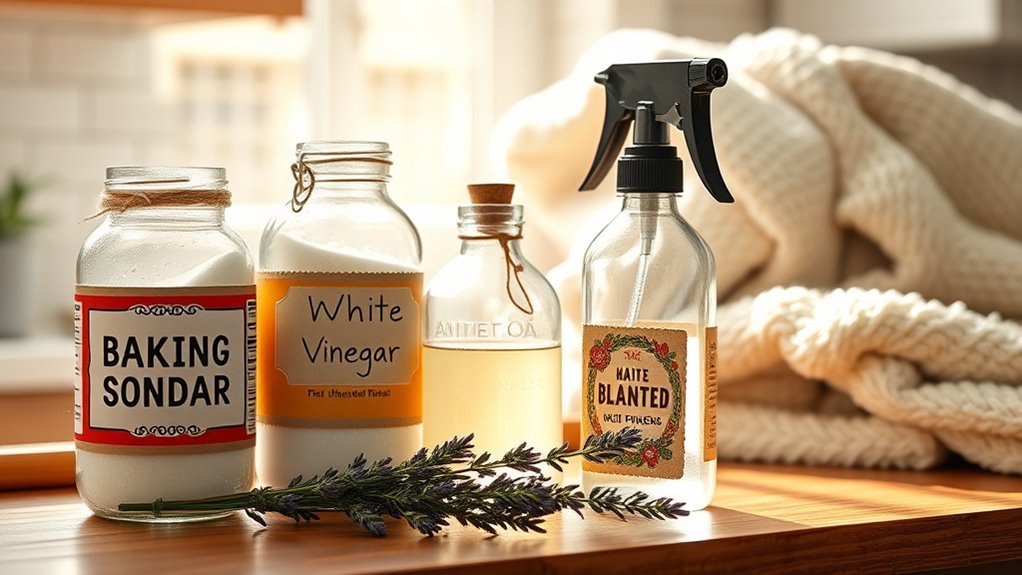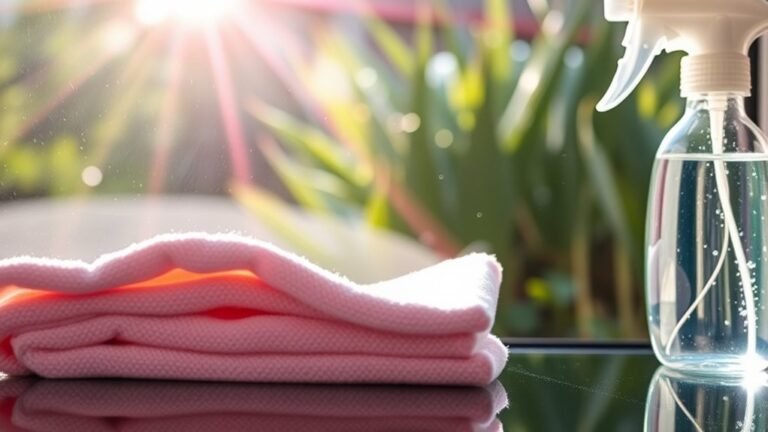Budget-Friendly DIY Cleaning Products for Blanket
You can easily freshen your blankets on a budget using simple DIY cleaners. Try mixing vinegar and a few drops of lavender or eucalyptus oil to break down dirt and add a calming scent. For stains, baking soda or a cornstarch paste work wonders without harsh chemicals. Lightly misting with a homemade deodorizing spray keeps odors at bay, and gentle washing with castile soap preserves softness. Keep your blankets cozy and clean—there’s plenty more tricks to explore for lasting freshness.
Essential Ingredients for Homemade Blanket Cleaners
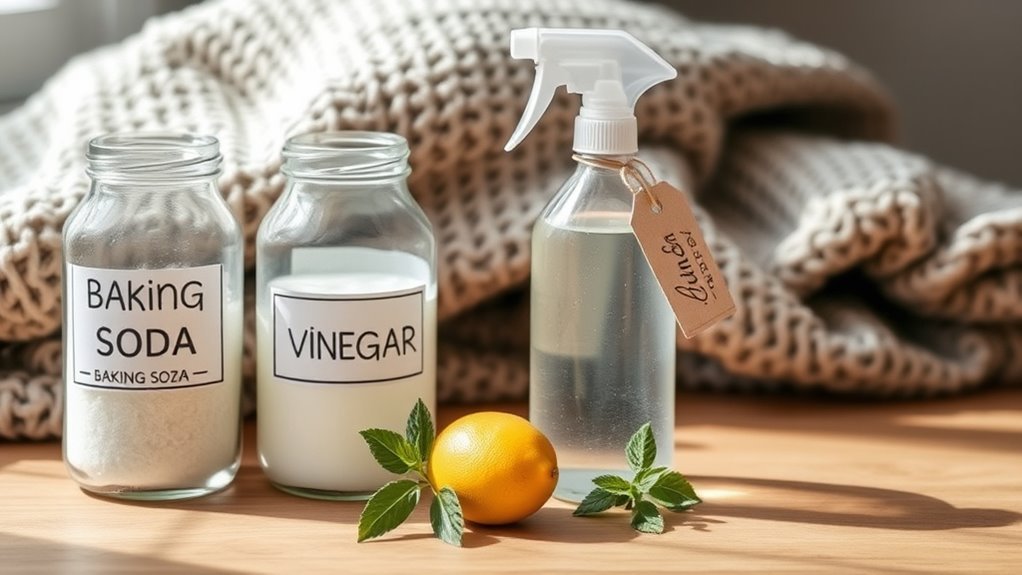
Before you start making your own blanket cleaner, it helps to know which ingredients work best. You want a solution that’s effective yet gentle, allowing you freedom from harsh chemicals. Vinegar benefits are a game-changer—it naturally breaks down dirt and odors without leaving residue. Adding essential oils not only freshens your blankets with your favorite scents but also brings antibacterial properties. Lavender or eucalyptus oils are popular choices for a rejuvenating, calming aroma. Together, vinegar and essential oils create a powerful, budget-friendly cleaner that’s safe for most fabrics. By choosing these simple ingredients, you’re taking control of your cleaning routine in a way that’s eco-friendly and liberating. You’ll feel good about what you’re using and enjoy soft, clean blankets every time.
DIY Stain Removal Solutions for Blankets
When stains appear on your blankets, you’ll want quick, effective solutions that don’t damage the fabric. Instead of harsh bleach, try fabric-safe bleach alternatives like a mix of baking soda and hydrogen peroxide. This combo breaks down stains gently, preserving your blanket’s texture and color. For oil or grease spots, a paste of cornstarch and water can absorb the stain before washing. Always test any DIY solution on a small, hidden area first to verify it’s fabric safe. You can also soak stubborn stains in a solution of white vinegar and water, which lifts grime without harsh chemicals. These budget-friendly methods let you maintain your blankets’ freshness while keeping control over what touches your fabrics—freedom from expensive, chemical-laden products.
Natural Deodorizing Sprays to Refresh Blankets
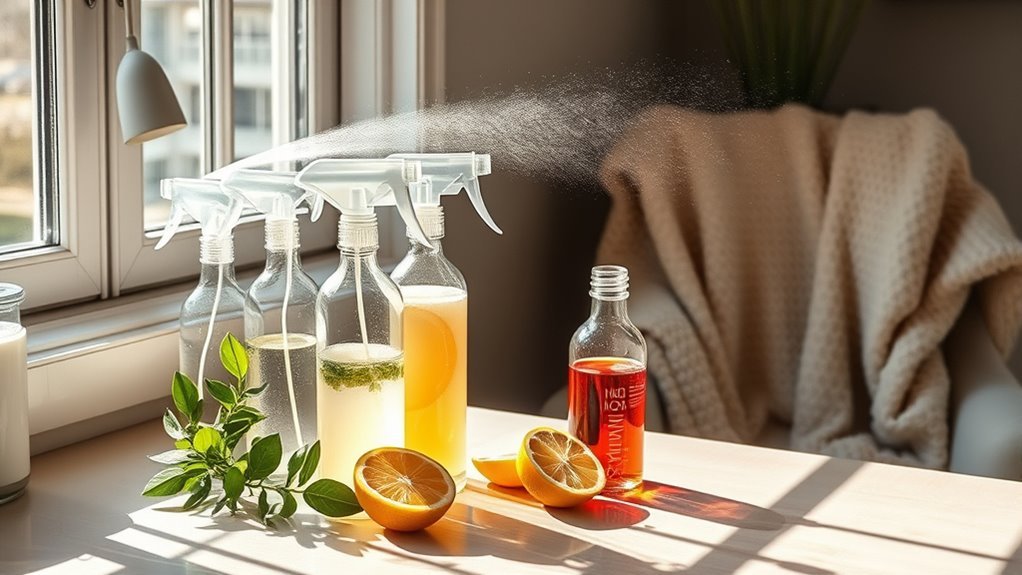
Although blankets can trap odors over time, you don’t have to rely on commercial sprays filled with chemicals to freshen them up. You can easily craft your own natural deodorizing sprays using simple ingredients and scented oils. Start by filling a clean spray bottle with water, then add a few drops of your favorite scented oils like lavender, eucalyptus, or peppermint. These oils not only mask odors but also offer calming or invigorating effects. Shake the bottle well before each use and lightly mist your blanket to refresh its scent without saturating the fabric. This DIY method gives you control over the ingredients, keeping your space free from harsh chemicals while keeping your blankets smelling clean and inviting. It’s an easy way to enjoy fresh, natural comfort whenever you want.
Gentle Washing Recipes for Delicate Fabrics
Revitalizing your blankets with natural sprays is just one way to care for your fabrics. When it comes to washing delicate blankets, you want to avoid harsh chemicals that can wear them down. Start by mixing a mild, DIY gentle detergent using liquid castile soap diluted in water. It’s perfect for preserving softness without stripping fibers. For extra care, blend in a natural fabric softener—try a solution of white vinegar and a few drops of essential oil. This combo keeps your blankets cozy and fresh without the stiffness from commercial softeners. Always wash on a gentle cycle or hand wash to maintain integrity. These simple recipes give you control, letting you keep your blankets fresh and soft while enjoying the freedom of homemade, budget-friendly care.
Tips for Maintaining Blanket Freshness Between Washes
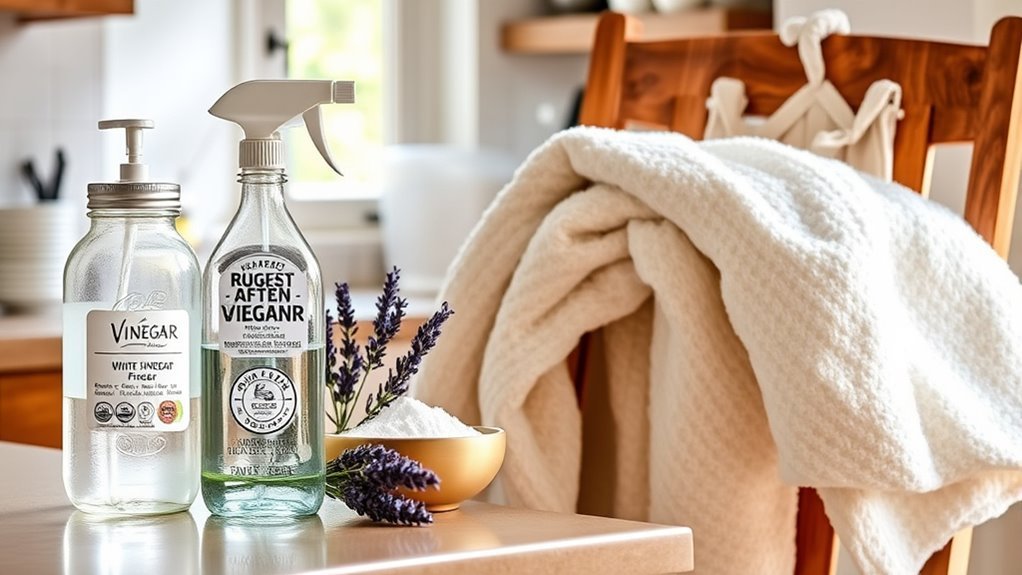
To keep your blankets smelling fresh and feeling clean between washes, you’ll want to focus on simple daily habits. First, make sure you’re airing them out regularly—just drape your blanket over a chair or hang it outside on a breezy day. Proper blanket storage is key, too; store them in breathable cotton bags or bins to prevent mustiness and odors. Avoid plastic containers that trap moisture. Sprinkle a little baking soda on your blanket now and then to absorb smells; just shake it off afterward. Freshness tips also include spot-cleaning small stains promptly to stop dirt buildup. These easy steps let you enjoy your blankets longer without frequent washing, giving you more freedom to relax and less time spent on chores.
Frequently Asked Questions
Can Homemade Cleaners Be Stored for Long Periods?
Sure, savvy storage sustains! When it comes to homemade cleaners, you’ll want to contemplate their shelf life carefully. Most DIY solutions last a few weeks to a couple of months if stored properly in airtight, dark containers. To maximize their magic, keep them cool and away from direct sunlight. By following smart storage tips, you can enjoy your cleaning freedom without worrying about spoiled solutions or wasted effort.
Are DIY Cleaning Products Safe for Allergy Sufferers?
You might wonder if DIY cleaning products trigger allergy reactions. When you choose safe ingredients like vinegar, baking soda, and mild essential oils, you’re generally on the safe side. These natural components reduce the risk of harsh chemicals causing discomfort. Just make sure to test any new mixture on a small area first, so you can enjoy cleaning freedom without worrying about unwanted allergy reactions or irritations.
How Do I Test a DIY Cleaner on My Blanket?
Before diving in, think of your blanket as a delicate dance partner—you want to move carefully. Start by scent testing your DIY cleaner on a small, hidden patch to verify the fragrance isn’t overpowering or irritating. Next, check fabric safety by applying a tiny amount, letting it sit briefly, and watching for any discoloration or texture changes. This way, you can clean freely without worrying about ruining your cozy companion.
Can These Recipes Be Used on Other Household Fabrics?
You can definitely try these recipes on other household fabric types, but you’ll want to be cautious. Different fabrics react differently to cleaning agents, so it’s smart to test a small, hidden area first to avoid damage. These DIY solutions are great for stain removal on sturdy fabrics, but delicate materials might need gentler care. Trust your instincts, and enjoy the freedom to experiment while keeping your fabrics fresh and clean!
What Are Eco-Friendly Alternatives to Common Cleaning Ingredients?
If you’re looking for eco-friendly alternatives to common cleaning ingredients, you can’t go wrong with vinegar and baking soda. Vinegar benefits include its natural antibacterial properties and ability to break down grime without harsh chemicals. Baking soda works wonders as a gentle abrasive and deodorizer. Using these frees you from relying on toxic cleaners, letting you clean effectively while keeping your home and planet safe. You’ve got the freedom to choose green!
